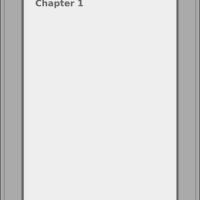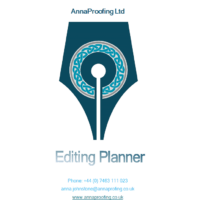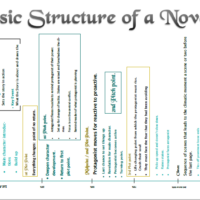
by Anna Johnstone | Jan 22, 2019 | Blog
Good morning!
Welcome to another Tuesday round-up. This week we have another great podcast from The Creative Penn (okay, total fangirl) discussing running a one-person business, the Kobo Writing Life talks about podcasting as content marketing., and the Writership podcast discusses scene and story resolutions. In articles, we have two very informative articles on shrinking author incomes, and another on corporate censorship and their unchecked power. I’ve not had time to check out videos for this week’s round-up, but hopefully, I’ll be able to gather a few links for next week.
Happy reading!
The Disastrous Decline in Author Incomes Isn’t Just Amazon’s Fault
The bookselling behemoth is making life harder for writers, but so is the public perception that art doesn’t need to be paid for.
Publisher's Weekly | Breaking Down Financial Woes for Writers
In an effort to gather as much information as possible about how much authors earned in 2017, the Authors Guild conducted its largest income survey ever last summer, reaching beyond the guild’s own members to include 14 other writing and publishing organizations. In all, the survey drew 5,067 responses from authors published by traditional publishers and from hybrid and self-published authors as well.
Corporate Censorship Is a Serious, and Mostly Invisible, Threat to Publishing
When state or civil authorities blacklist books, the act is correctly labeled censorship. But what is the word when corporations order their subsidiaries to snuff out information?
The Creative Penn | How To Be A Successful Company Of One With Paul Jarvis
What if you could scale your revenue without growing your expenses? What if you could make a living with your writing but still remain alone in your writing room? I discuss these questions and more today with Paul Jarvis.
In the intro, I talk about second-hand book sales [Dean Wesley Smith], how the death of poet Mary Oliver can help deepen our writing [listen to her on the On Being Podcast], why ‘sparking joy‘ is so important (referencing Marie Kondo on Netflix), plus the Kickstarter for Intellectual Property Tracking.
Kobo Writing Life | Ep 133 – Let’s Talk Podcasting with Amanda Cupido
n this week’s episode, Cristina sits down with author and podcast producer Amanda Cupido to talk about her book Let’s Talk Podcasting: The Essential Guide to Doing it Right. Amanda talks about how she got into podcasts, the difference between podcasts and older media such as radio, and she discusses the underrepresented voices in the podcasting community. Amanda also shares her tips for starting your own podcast and the most common roadblock that aspiring podcasters encounter.
Writership Podcast | Ep. 136: Resolutions
We all have some idea of what a resolution is, but what are these scene and story-enders meant to do? In this episode, I explore scene and story resolutions in the context of C. Gabriel Wright’s LBGTQ love story, “Someone.” The editorial mission encourages you to collect resolutions by reading and watching stories—and from your own life.
by | Jan 20, 2017 | Advice, Blog
Writer’s First Rule.
People pay you for your work. Not the other way around. If someone asks you to pay money, ANY money, in order represent your work you need to do several things:
- Tell them you are no longer interested
- Block their number
- Add their email to your ‘blocked senders’ list
Preditors & Editors was an excellent source list of the good, the bad, and the evil in the world of writing services, but unfortunately, it appears to no longer be active.
The advance.
The sum that the publisher pays you which reflects expected sales. Unless you break the contract that’s yours regardless of how well your book sells
Earn-out
Well done. Your book has earned back your advance and then some. You now get to keep your royalties.
Rights
This is the permission you give to the publisher to publish your work in a specific form, language and place. A legitimate publisher will pay you for these rights as part of your contract, but not on a permanent basis. At the end of a set term they revert to you and if that publisher wants them back, they have to pay again. Do not sign any contract which gives the ‘publisher’ permanent rights.
Royalties
A payment structure which offers a percentage of each sale to you. An average figure would be 6-9% for paperback and 10-12% for a hardback. Ebooks earn a whopping 25%. Often the rate increases as more are sold. It is vital that you get a regular statement for these.
Getting paid
The publisher will give you an advance based on what they think they can sell, then royalties on each copy sold. If you have an agent, you will have to pay a small percentage in return for representation. Your royalties should be paid on at least a six-monthly basis from a large publishing house. Smaller ones may have a shorter schedule.
A £10k advance (lucky you) to sell your hardback novel at £10 each at a rate of 10% would earn the writer £1 per copy. They would have to sell 10,000 copies to earn out that advance. Selling anything over 10k copies is when they start paying you the rate switches around and the publisher gets £1 per copy.
Writer’s Second Rule
The agent only gets paid based on what you sell. You do not pay an agent to represent you. 15% is about average. and they don’t get paid until you do.
There may be odd business tax expenses that you need to take care of but these are infrequent and not the same as fees.
What are agents for?
- Handling contract negotiations
- Submissions of manuscripts to editors. Many of the big publishers do not accept manuscripts without an agent. You may struggle with this without an agent.
- Career advice
- Troubleshooting any problems between publisher or editor and you.
- Handling foreign rights, TV, film etc.
- Some might offer editorial assistance
How involved the get will depend entirely on the agent. Always be sure about what you want, and that they are prepared to provide it. If they want 15% of your hard earned royalty, they must earn it. Whether you opt for an agent is entirely up to you. Do not be tricked into believing you must have one for ‘legal reasons’. Anyone can hire a solicitor to look over a contract, but this is a one-off expense and it won’t mean giving up 15% of your sales.
How do I catch one?
You will need to write a convincing query letter along with a sample of the manuscript. Remember the agent won’t get paid unless it sells, they are going to need to be convinced that their time and effort won’t be wasted on a dead-parrot. If an agent accepts straight away or asks for a fee, walk away.
Writer’s Third Rule
Never pay a publisher. A publisher’s role is to print and sell books. The honest ones pay writers to produce work to print. If they ask you for money, run away. These publishers either have no ability or intention to provide marketing or distribution because you have already given them what they are looking for. Money. You would be better off doing it for free on Amazon, a free WordPress blog to serve as an author website, a free facebook page and a twitter account. Be aware that self-marketing without paid advertising is very time consuming and labour intensive (take it from someone who has been working their socks off trying to get a new start-up off the ground for the best part of a year).
Editors.
- Hired by a publishing house to buy the manuscripts for print and sale, or
- Freelancers who help writers get their work to a level where it is fit to be published.
Publishers’ editors are paid by the publishing house, not you, and will work with you until they are happy that the work is saleable. They are responsible for the quality of the finished product.
I am in box number 2. We’re hired by writers to help get your work to a standard where it can be sold. On average you can expect to pay between £25 and £100 per hour for their time and skill. Many of us prefer to charge by word count as it is never clear how much work will be needed on an individual manuscript. If you are looking to publish traditionally, you do not need to hire an editor to get the book ‘ready’ as the in-house editor will do that, but you will need to be certain that the work is of a professional quality. The publishing house should not be asking you for any money to do this work.
If you are looking to publish traditionally, you do not need to hire an editor to get the book ‘ready’ as the in-house editor will do that, but you will need to be certain that the work is of a professional quality. The publishing house should not be asking you for any money to do this work. If you are looking into self-publishing, then an editor is a must. A bad or cheap edit will stand out a mile.
You are not looking for cheap here either. Look at testimonials, look at their websites etc. If they are dirt cheap and have no testimonials, there will be a good reason. If a freelance editor demands more than a 50% upfront deposit, do not hire them.If they don’t offer free samples or refuse to offer a service agreement, these are also red flags.
Self-publishing is not the same as ‘vanity-press’.
Thankfully the stigma of self-publishing has somewhat decreased in recent years, and it has been made easy what with the rise of Amazon Kindle, iBooks, Kobo, Smashwords and Createspace et al. which are generally free except in terms of time and effort. Traditional publishing has been known to take in excess of a year to get books from the author to the page and into the shops. The cost of self-publishing comes in the fact that you are in charge of your own cover, editing, marketing etc. There are also no advances. On the other hand, royalties are paid monthly, come at around 70%, you retain all the rights. It is very important to read all of the terms and conditions before signing up to any of these services. Exclusivity deals, while on the surface might look fruitful but be aware that in recent weeks Amazon has been known to delete whole accounts on the basis of a suspicion. You will have to look carefully into all your options before deciding which route to take.
Sources
More on editors etc.














